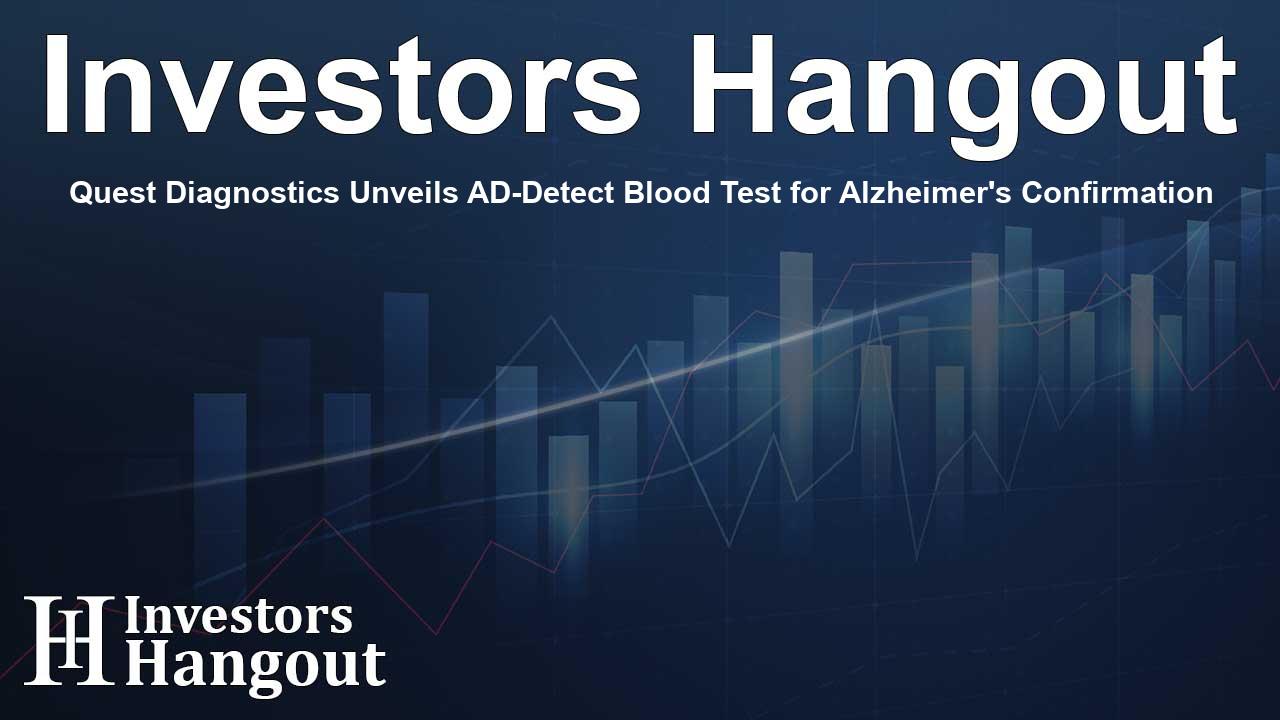Quest Diagnostics Unveils AD-Detect Blood Test for Alzheimer's Confirmation

Quest Diagnostics Introduces Revolutionary AD-Detect™ Blood Test
Quest Diagnostics has made a significant stride forward in the field of diagnostic testing with the launch of its new AD-Detect™ blood test, designed to provide healthcare providers with critical insights into Alzheimer’s disease (AD). This innovative test aims to assist physicians dealing with patients experiencing mild cognitive impairment (MCI) or dementia by accurately confirming amyloid brain pathology. Recent data showcases the test's outstanding performance, boasting more than 90% sensitivity and specificity — affirming its reliability in a clinical setting.
Understanding Alzheimer's Through Blood Testing
The AD-Detect™ Abeta 42/40 and p-tau217 Evaluation melds different biomarkers, combining amyloid beta (AB) 42/40 metrics obtained via proprietary mass spectrometry techniques with p-tau217 levels from an in vitro immunoassay. This comprehensive evaluation produces the AD-Detect Likelihood Score™, a metric created through a specially validated algorithm, ensuring its efficacy in identifying Alzheimer’s.
The Evolution of AD-Detect Testing
This test extends the capabilities of previous iterations of the AD-Detect suite, which focused on assessing AB 42/40 and p-tau217 individually. The newly launched panel incorporates genetic indicators such as the ApoE isoform, presenting physicians with a holistic tool to ascertain the confirmation of amyloid pathology rather than merely estimating Alzheimer’s risk. Kathleen Valentine, Vice President and General Manager of Neurology at Quest Diagnostics, emphasizes this integration, explaining that it allows for tailored testing that can better suit individual patient needs.
Scientific Backing and Real-World Evidence
Recent oral presentations at major neurology conferences have underscored the robustness of this testing approach. Notably, researchers reported a positive predictive value (PPV) and negative predictive value (NPV) of 89%, which indicates strong test reliability. This robustness is particularly relevant to patients with MCI, providing healthcare providers a clearer pathway for treatment decisions based on blood test results.
By scrutinizing real-world specimens, the study illustrated how the test performs across diverse populations, indicating a 42% likelihood of positive PET scans among patients, with only 15% facing indeterminate risk. The inclusion of ApoE genetic markers further refined the accuracy of these assessments, showcasing the test's proficiency even within a population with a lower prevalence of Alzheimer's disease.
Barriers to Alzheimer’s Diagnosis and Testing Accessibility
Traditional approaches to diagnosing Alzheimer’s, such as amyloid PET scans and lumbar punctures, are often cost-prohibitive and invasive. Quest Diagnostics’ new blood test presents a non-invasive alternative that is more accessible to patients and with significantly lower costs. This is particularly crucial as the aging population faces increasing rates of cognitive impairments.
Expanding Testing Facilities and Future Implications
Following the launch of the AD-Detect test, patients in the United States, excluding New York for the moment, can now obtain tests through Quest’s extensive patient access network, featuring approximately 8,000 points nationwide. This includes 2,000 patient service centers and mobile phlebotomy services, enhancing patient convenience and ensuring timely diagnosis.
With nearly 7 million Americans currently facing Alzheimer’s — a number that alarmingly may rise to 14 million by 2060 — effective solutions like Quest's AD-Detect test could revolutionize the management of the disease. The change is also reflected in healthcare professionals’ views; a significant majority are optimistic that advancements in testing could turn Alzheimer’s into a treatable condition.
Commitment to Innovation at Quest Diagnostics
Quest Diagnostics is resolute in its mission to push forward advanced diagnostics in Alzheimer’s and other neurological conditions. Their commitment to improving healthcare outcomes through innovative medical insights remains a driving force in their operations. As the company continues to develop cutting-edge testing methods, they pave the way for a healthier future for millions.
Frequently Asked Questions
What is the purpose of the AD-Detect™ blood test?
The AD-Detect™ blood test aims to help physicians confirm amyloid brain pathology in patients with mild cognitive impairment or dementia.
How does the AD-Detect test work?
The test combines blood levels of amyloid beta and p-tau217 to produce a likelihood score indicating the presence of Alzheimer’s pathology.
What are the expected outcomes from using this test?
The test is expected to provide accurate diagnostics, enabling faster treatment pathways and improving patient access to care.
Why is this test significant compared to traditional methods?
It offers a non-invasive, cost-effective alternative to more invasive methods like PET scans and lumbar punctures.
When will the test be available to patients?
The test is currently available for most patients in the U.S., except those in New York, where clinical application is pending.
About The Author
Contact Riley Hayes privately here. Or send an email with ATTN: Riley Hayes as the subject to contact@investorshangout.com.
About Investors Hangout
Investors Hangout is a leading online stock forum for financial discussion and learning, offering a wide range of free tools and resources. It draws in traders of all levels, who exchange market knowledge, investigate trading tactics, and keep an eye on industry developments in real time. Featuring financial articles, stock message boards, quotes, charts, company profiles, and live news updates. Through cooperative learning and a wealth of informational resources, it helps users from novices creating their first portfolios to experts honing their techniques. Join Investors Hangout today: https://investorshangout.com/
The content of this article is based on factual, publicly available information and does not represent legal, financial, or investment advice. Investors Hangout does not offer financial advice, and the author is not a licensed financial advisor. Consult a qualified advisor before making any financial or investment decisions based on this article. This article should not be considered advice to purchase, sell, or hold any securities or other investments. If any of the material provided here is inaccurate, please contact us for corrections.
